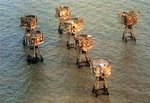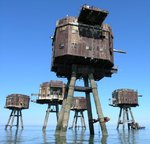Njaco
The Pop-Tart Whisperer
The Thames Estuary Army Forts were constructed in 1942 to a design by Guy Maunsell, following the successful construction and deployment of the Naval Sea Forts. Their purpose was to provide anti-aircraft fire within the Thames Estuary area. Each fort consisted of a group of seven towers with a walkway connecting them all to the central control tower. The fort, when viewed as a whole, comprised one Bofors tower, a control tower, four gun towers and a searchlight tower. They were arranged in a very specific way, with the control tower at the centre, the Bofors and gun towers arranged in a semi-circular fashion around it and the searchlight tower positioned further away, but still linked directly to the control tower via a walkway. All the forts followed this plan and, in order of grounding, were called the Nore Army Fort, the Red Sands Army Fort and finally the Shivering Sands Army Fort. All three forts were in place by late 1943, but Nore is no longer standing. Construction of the towers was relatively quick, and they were easily floated out to sea and grounded in water no more than 30m (100ft) deep.
Access for the men posted to these forts was via an entrance at the base of the platform. Parts of the ladders that the men would have used are still visible today, but are in a very poor condition. Indeed, attempting to access these forts is extremely hazardous, and they are best viewed from a boat and a safe distance. All 3 forts saw action during the Second World War, and there is no doubt that they proved their worth. So much so in fact that anti-aircraft command called for the construction of more sea forts on the Thames in the immediate post-war period, and various new fort designs were put forward. However, none of them came to fruition and in 1952 the government decided not to pursue the sea fort construction programme any further. Nore Army Fort sustained damage during a storm in 1953, and tragedy struck the same fort again 2 months later when a ship hit and destroyed the Bofors and one of the gun towers. Four civilian caretakers were killed in this incident. In 1955, the War Office decided that the Army Sea Forts had no further operational value. The Nore Army Fort was dismantled in 1959, but the Red Sands and Shivering Sands Forts are still standing today. They have been used as pirate radio stations during the 60's and 70's, but since then have remained abandoned.
Maunsell Sea Forts
Maunsell Forts - Wikipedia, the free encyclopedia
Maunsell abandoned Army Sea Forts, Red Sands Shivering Sands, Thames estuary, UK
Access for the men posted to these forts was via an entrance at the base of the platform. Parts of the ladders that the men would have used are still visible today, but are in a very poor condition. Indeed, attempting to access these forts is extremely hazardous, and they are best viewed from a boat and a safe distance. All 3 forts saw action during the Second World War, and there is no doubt that they proved their worth. So much so in fact that anti-aircraft command called for the construction of more sea forts on the Thames in the immediate post-war period, and various new fort designs were put forward. However, none of them came to fruition and in 1952 the government decided not to pursue the sea fort construction programme any further. Nore Army Fort sustained damage during a storm in 1953, and tragedy struck the same fort again 2 months later when a ship hit and destroyed the Bofors and one of the gun towers. Four civilian caretakers were killed in this incident. In 1955, the War Office decided that the Army Sea Forts had no further operational value. The Nore Army Fort was dismantled in 1959, but the Red Sands and Shivering Sands Forts are still standing today. They have been used as pirate radio stations during the 60's and 70's, but since then have remained abandoned.
Maunsell Sea Forts
Maunsell Forts - Wikipedia, the free encyclopedia
Maunsell abandoned Army Sea Forts, Red Sands Shivering Sands, Thames estuary, UK




 At this time of the war, a proactive govt was likely a significant boost to morale that one cannot comprehend wrt equating enemy war machines destroyed or operations stymied.
At this time of the war, a proactive govt was likely a significant boost to morale that one cannot comprehend wrt equating enemy war machines destroyed or operations stymied.